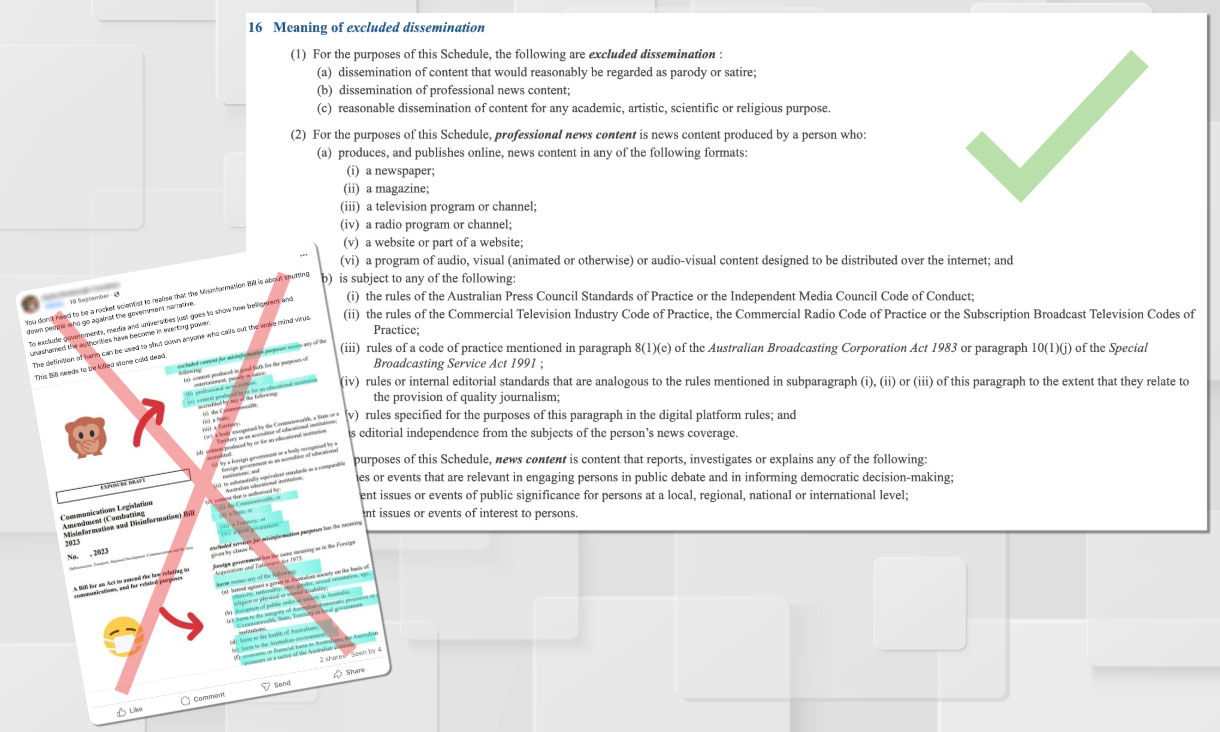
Proposed misinformation law would not exempt government content
The claimA proposed Australian law to improve how digital platforms tackle online falsehoods will not apply to government messaging. |
Our verdictFalse. The latest version of the federal Combatting Misinformation and Disinformation Bill 2024 does not contain exemptions for government content. |
By Eiddwen Jeffery
A proposed Australian law to reduce the risks posed by online falsehoods has been criticised by social media users who claim the bill cracks down on misinformation shared by individuals but not by the federal government.
The prime minister “wants to implement a misinformation bill to silence us all, but the bill of course excludes the government, the worst perpetrator of misinformation!” claimed an October 2024 Facebook post.
Other Facebook users claimed that the bill “covers topics like ‘public health’ and even ‘banking’, but excludes the Government”, arguing the law would allow the federal communications regulator, the Australian Communications and Media Authority (ACMA), to censor anything it deems to be misinformation.
But claims that government content is exempted from the bill rely on outdated information. Although an exemption for government-authorised content was included in an earlier draft of the bill, it has now been scrapped.
 The revised misinformation bill does not exempt government content.
The revised misinformation bill does not exempt government content.
Claims cite outdated exemptions
The government has proposed a suite of new rules to deal with the impact of online falsehoods as part of its Communications Legislation Amendment (Combatting Misinformation and Disinformation) Bill 2024.
In June 2023, the government released an exposure draft of the bill, which proposed to exclude certain types of information from its scope, such as professional news content, content that is entertainment, satire or parody, and content produced by or for educational institutions.
Content authorised by local, state, territory or Commonwealth governments and electoral material was also “excluded content for misinformation purposes”.
However, the bill was redrafted in response to public feedback and a revised version was introduced to parliament on September 12, 2024.
The latest version of the bill, available on the parliamentary website, does not include any exemptions for government content. An accompanying fact sheet (link no longer available) says the government has “removed the exclusion for government-authorised content and authorised electoral matter”.
Exemptions do, however, remain for professional news content, content that would be regarded as parody or satire and content shared for any academic, artistic, scientific or religious purpose.
Michael Davis, a research fellow at the University of Technology Sydney’s Centre for Media Transition and former ACMA policy advisor, told RMIT Lookout the earlier government exemption was aimed at protecting critical official information, such as during emergencies, but was removed following public criticism.
Social media users have nonetheless continued to claim the law would not apply to government-authorised content, including independent senator Gerard Rennick.
Senator Rennick’s posts, which were published after the revised bill was presented to parliament, feature a screenshot of the 2023 draft. His posts have been collectively reshared close to 3,000 times.
So, what is the government proposing?
The government’s bill aims to ensure social media and other digital platform providers take appropriate steps to address the risks of “seriously harmful” misinformation and disinformation.
Broadly speaking, misinformation refers to false or misleading content shared inadvertently, and disinformation refers to such content deliberately shared to deceive.
The proposed law would require platforms to report on their management of these risks, publish misinformation policies and develop plans to improve media literacy. It would also allow the regulator to make rules forcing them to keep records and hand over documents.
In addition, the ACMA would be empowered to approve and register enforceable codes of practice developed by the industry or to develop its own standards where these prove inadequate.
Dr Davis told RMIT Lookout the ACMA could not request the removal of particular posts, pages or accounts and any decision to remove social media posts would remain with digital platforms.
This limit on the ACMA’s powers is contained in section 67 of the 2024 bill and explained by a fact sheet (link no longer available) that says “nothing in the bill could require the removal of content or blocking end-users unless it is disinformation that involves inauthentic behaviour such as bots”.
The Senate Environment and Communications Legislation Committee is expected to report back on the bill in November 2024. RMIT Lookout has provided a submission to the committee which can be downloaded from the parliamentary website.
Editor's note: On November 24, the government announced it would not proceed with the bill.
Our verdictFalse. The Combatting Misinformation and Disinformation Bill 2024 gives the Australian media regulator new powers to ensure digital platforms are addressing online misinformation and disinformation. A 2023 draft of the bill contained provisions that said the proposed law would not apply to government-authorised content. However, this exemption was removed in a revised version of the bill, introduced to parliament on September 12, 2024. Online claims that the bill exempts government content are therefore wrong. |
Acknowledgement of Country
RMIT University acknowledges the people of the Woi wurrung and Boon wurrung language groups of the eastern Kulin Nation on whose unceded lands we conduct the business of the University. RMIT University respectfully acknowledges their Ancestors and Elders, past and present. RMIT also acknowledges the Traditional Custodians and their Ancestors of the lands and waters across Australia where we conduct our business - Artwork 'Sentient' by Hollie Johnson, Gunaikurnai and Monero Ngarigo.